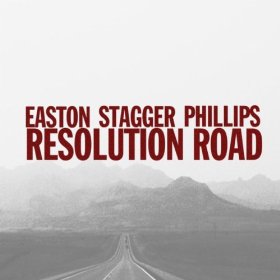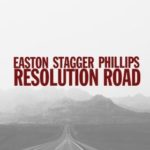
Rebeltone/Campfire Propaganda
Birthed in an Alaskan cabin back in the winter of 2008, the musical collective known as Easton Stagger Phillips is one of those classic examples of big talents quietly doing their thing beneath the sweep of the mainstream radar.
Any bigbox PR outfit worth their salt would have a field day coming up with catch phrases for ESP. Heck, I’m only on my first early-AM cup of kona and I can grab ‘em out of thin air while the trio’s new Resolution Road spins in the background.
Dig it:
• “If Middle Brother were the bastard stepchildren of The Replacements, then Easton Stagger Phillips are the Beatles-influenced version of Middle Brother.”
• “Easton Stagger Phillips are blessed with the ability to craft brilliant, hooky tunes out of the most basic of components. The key is, they always start from the heart.”
• “How one album can straddle the gamut from late-60s AM radio to modern-day indie goodness is beyond me, but ESP manages to do just that.”
I could go on, but you must get the picture at this point: Easton Stagger Phillips’ new Resolution Road is a wicked album, fresh yet familiar at the same time. Principles Tim Easton, Leeroy Stagger, and Evan Phillips know exactly how to push the right buttons inside you, whether it’s a riff or groove that you’d swear was already in your marrow – or a phrase that nails something you’ve felt in the core of your soul but never said aloud.
One of the coolest things about the ten tracks on Resolution Road is there are no obvious Tim Easton songs or Leeroy Stagger numbers or Evan Phillips tunes; they all sound like Easton Stagger Phillips and that’s a neat, ego-free and talent-rich thing. Oh, sure – this song may have been penned by that member or one of the boys takes the lead vox on this one or that one, but it matters not: the end result is an album of goodness.
Things get rolling with “Always Came Back To You” – stately drums and bass providing the underpinnings for harmonies that manage to be spot-on but never sugary (there’s a constant thread of real-as-Hell throughout Resolution Road ). The final 45 seconds alone are a piece of work as the bass begins a slow walk into the sunset and the guitar chime gets progressively growlier into the fade. On the other end of the album is “Baby Come Home”: simple, heart-tugging piano-and-organ glide with a chorus that could just as easily be sung from the top of a mountain as it could from a bar stool … and mean just as much.
In between you’ll find stuff like “Those Good Times (LMSU)”, which bouces along so fine and dandily that you won’t even realize what’s actually being said unless you pay attention – really pay attention – to the words. (Love that bass line – total Snoopy dance.) Or “Life Of Crime”, where a layer of mandola and almost-military-sounding drums combine to maintain a bit of tension, making you want to turn your collar up against the cold and trudge on.
If you want comparisons, you actually can find some All Shook Down -era Replacements here, truth be known (“So Much In Tune” or “Lucilla”, which both strike a nice balance between sweetness and growl). And while The Beatles’ influence is never far away, the combination of sweet harmonies and a honey-dripping slide guitar break on “Traveller” would make George Harrison smile extra wide. “Highway Is My Home” could be the result of Robert Gordon and Link Wray hanging out with the Everly Brothers, shimmering gasoline geetar tone and all.
Eff the bigbox PR outfits. There’s no media blitz behind Resolution Road, but that’s okay. It’s simply just good music and you should listen to it and that’s that.
*****
Brian Robbins doesn’t have a mandola, but he does keep a bouzouki hanging on the wall over at www.brian-robbins.com.



No Comments comments associated with this post